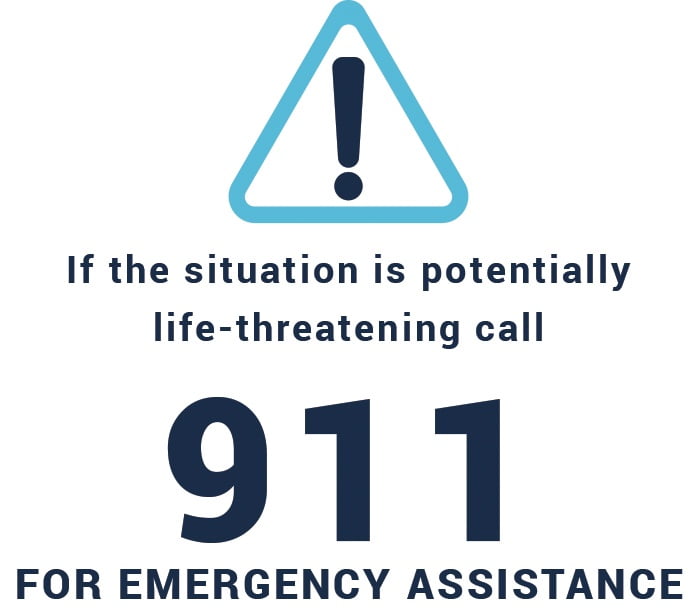Questions and Answers
OnTrAK is specialized program from Mat-Su Health Services that works to provide rapid identification, support, assessment, and treatment for youth and young adults who are experiencing early signs and symptoms of psychosis.
OnTrAK serves adolescents and young adults between 15-25 years of age in the Mat-Su Borough who have been experiencing psychosis within the last two years. OnTrAK provides services to the individual and his or her "family".
Family is defined by the youth. Family members may or may not be biological relatives and can also include individuals who are committed to supporting the youth.
"Psychosis" is a broad term that covers many different symptoms and experiences. Generally, psychosis can be defined as a break from a person’s past perceptions of reality, which might make it harder for them to understand the world or themselves (Summers, C.).
Common symptoms include:
- Feeling overwhelmed by sensory information (lights seem too bright, noises too loud)
- Difficulty filtering stimulation from the environment
- Hallucinations (seeing, hearing, feeling, or tasting things that other people don’t)
- Confused thinking or speech
- Delusions (false personal beliefs based on incorrect inferences about reality which are inconsistent with culture and previous beliefs, and which are firmly sustained in spite of evidence or proof to the contrary)
- Difficulty doing ordinary things (often includes problems with memory, attention, putting thoughts together)
Psychosis is not a multi-personality disorder, psychopathy, or insanity. "Psychotic" describes someone who is experiencing psychosis. This word has been wrongly used by society to describe someone who is crazy, when in fact they are suffering from a treatable mental illness.
Some of the most common signs of psychosis include:
- A sudden loss of interest in things that the person used to find enjoyable
- Inability to do the things that the person could do before (e.g., a person who normally loves math suddenly can't do it anymore)
- Social withdrawal and isolating from friends and family
- Dramatic changes in sleep pattern
- Statements or behavior that are bizarre and inconsistent with whatever is going on around them
Anyone can experience and develop psychosis and it affects 3 in 100 people. Many people see or hear things that others don’t, or have ideas that are unusual. Psychosis is only a problem when it is causing you or someone close to you significant distress or harm.
Early signs of psychosis related to a psychotic disorder usually occur between the ages of 15 and 25 and rarely emerge suddenly. Most often, the symptoms evolve and become gradually worse over a period of months or even years. Men often develop psychosis 5 to 10 years younger than women. It can be caused by a variety of medical illnesses, sleep deprivation, severe stress or trauma, drug reactions, genetic predisposition, and other factors. Early symptoms often include cognitive and sensory changes which can cause significant disability.
The common types of diagnosed psychotic disorders are schizophrenia, schizophreniform, and schizoaffective disorder. These diagnoses mean that a person often experiences a unique cluster of psychosis symptoms which can interfere with a person’s ability to concentrate, memorize, and communicate with others. These terms are often misused in the popular press and even sometimes by doctors.
Studies have shown that with early intervention and appropriate treatment, people suffering from psychosis can and do get better.
Services within the OnTrAK program last about 2 years through different phases of care. Individuals have the opportunity to continue with some services and supports thereafter.
Mat-Su Health Services, the parent agency for the OnTrAK program accepts Medicaid, Medicare, and most private insurance providers. Mat-Su Health Services also offers a sliding scale fee service based on household size and income. OnTrAK services are available irrelevant of a person’s ability to pay.
OnTrAK is designed for early experiences of psychosis (experiencing symptoms for less than two years). If a person has been experiencing psychosis for several years they are unlikely to qualify, yet may benefit from other services offered at Mat-Su Health Services. Call or write today for a free consult.
If you do not qualify for the OnTrAK program, there are a number of other services available at Mat-Su Health Services or in the community. The OnTrAK program referral and eligibility process begins with a free, confidential telephone screening to gather information to determine if you qualify. We will offer specific referrals or a list of resources if OnTrAK does not fit your needs.
Anyone can refer an adolescent or young adult to the program. If you would like to refer someone, please call Aleshia Kirchner, the Program Coordinator at(907) 352-3238 or (907) 775-5681. Please see our Team page for contact info for additional team members.

